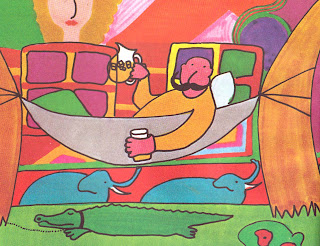I suppose it bears mentioning that one of the things I want to be "when I grow up" is a translator, specifically a translator of literature. I want to do this because I am (theoretically) a writer, and I think that, when one translates words and sentences from one language to another, it's not just a mechanical process of substituting one word and meaning for its equivalent. In order to do it well, you have to have a mastery of the language you're translating into so that you can shape it in a way that is not only true to the form of the source text, but also to the deeper meaning and the effect. It's no good trying to translate the poetry of Borges from Spanish into English, if you don't understand writing poetry in English in the first place. A literal translation of poetry (and of most of literature) would sound wooden and strange. It would clunk along, having lost all of the music and beauty of the original, and people reading it would be put off and possibly spend their lives believing that Borges was a terrible poet with no sense of rhythm or language. Which would be a tragedy. So in order to do it right, you would need to read and understand the original, and then take it and shape the target language around it in your head, looking for images and expressions and words that can convey the beauty without losing the meaning.
And honestly, I think it's very difficult to do well. But it is worth doing.
All this is really just a preamble to saying that I would like to do this, and so, as I've been often reminded by the Sandwich, I have to practice doing it. Because I will not just wake up one morning being good at literary translation, I will have to work at it and study and practice practice practice. And now that I've FINALLY gotten myself inspired to do so, I would like to post some of the results here, to keep me motivated, hopefully. Or just to remind myself that I do have a goal here, and that even doing little things like wrapping other people's poetry in my own words and language are little steps in the direction that I want to go.
* * *
The following are poems written by Roque Dalton, a Salvadoran poet on whom I wrote my Spanish thesis. I don't own any of them and the translations I've done are not yet perfect.
My poetry
is like the Sempervivum
it pays its price
for existence
in terms of bitterness.
Between the rocks and the fire,
faced with the tempest
or in the midst of the drought,
from above the banners
of necessary hate
and the gorgeous drive
of rage,
the flower of my poetry always seeks
the air,
the humus,
the sap,
the sun,
of tenderness.
*The Sempervivum is a genus of succulent plants also known as Houseleek or Liveforever.
"Like you" -
translation of "Como tú" by Roque Dalton
I, like you,
love Love,
Life,
the sweet enchantment of things
the celestial landscape of January days.
My blood also boils
and I weep with eyes
that have known the sting of tears.
I believe that the world is beautiful,
that poetry is like bread,
it belongs to everyone.
And that my veins do not end in me,
but in the unanimous blood
of those who fight for Life,
Love,
Things,
the landscape and the bread,
the poetry of all.
"The vain man" -
translation of "El vanidoso" by Roque Dalton
Mine would be a grand death.
My vices then would shine like old jewels
with the delicious colors of venom.
There would be flowers of all aromas on my tomb
and the young people would imitate my gestures of exultation,
my hidden words of anguish.
Perhaps someone would say that I was loyal and that I was good.
But only you would remember
my way of looking you in the eye.
One of the faces of love is death,
in the smoke of this eternally youthful age.
What remains to me before you if not the perplexity of kings,
the gestures of learning before the river's flood,
the footprints of the prone figure among the ashes?
Youth fades away
and gloom gallops in like a mule.







